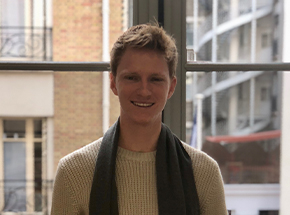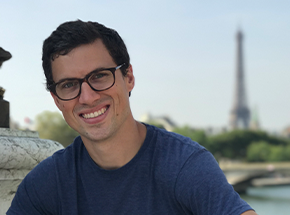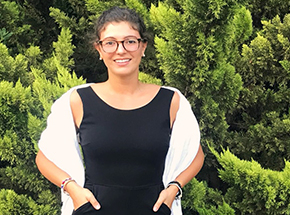- About AUP
- History of AUP
- Mission & Core Values
- Vision and Leadership
- AUP Recognition
- Alumni Success
- Campus Development
- Arts at AUP
- Policies & Guidelines
- Academics
- Undergraduate
- Graduate Programs
- MA in Diplomacy and International Law
- MA in Global Communications
- MSc in Human Rights and Data Science
- MA in International Affairs
- MA in International Affairs, Conflict Resolution, and Civil Society Development
- MSc in International Management
- MSc in Strategic Brand Management
- Find Your Thesis Advisor
- Previous Programs
- Cultural Program
- Faculty
- Summer School
- Research Centers
- The Center for Critical Democracy Studies
- The Center for Writers and Translators
- The George and Irina Schaeffer Center for the Study of Genocide, Human Rights and Conflict Prevention
- The Joy and Edward Frieman Environmental Science Center
- The Center for Media, Communication & Global Change
- Departments
- Academic Resources
- Academic Affairs
- Academic Calendar
- Academic Resource Center
- Library
- Registrar's Office
- Teaching and Learning Center
- Employer Network
- Accessibility & Accommodation Services
- Quai D'Orsay Learning Commons
- Paris as Classroom
- ACE Center
- Admissions
- Student Life
- Campus
- Student Leadership & Involvement
- Paris
- Support Services
- Student Development Help Desk
- Student Accounting Services
- Student Immigration Services
- Student Grievance Procedure
- Diversity and Inclusion
- Health & Well-being
- Digital Student Handbook
- News
- Events
- AUP Giving
- Housing Offer for 2024-2025
- Housing | Spring 2024
- IRIS Project
- IT Services
- Alumni
- About AUP
- History of AUP
- Mission & Core Values
- Vision and Leadership
- AUP Recognition
- Alumni Success
- Campus Development
- Arts at AUP
- Policies & Guidelines
- Academics
- Undergraduate
- Graduate Programs
- MA in Diplomacy and International Law
- MA in Global Communications
- MSc in Human Rights and Data Science
- MA in International Affairs
- MA in International Affairs, Conflict Resolution, and Civil Society Development
- MSc in International Management
- MSc in Strategic Brand Management
- Find Your Thesis Advisor
- Previous Programs
- Cultural Program
- Faculty
- Summer School
- Research Centers
- The Center for Critical Democracy Studies
- The Center for Writers and Translators
- The George and Irina Schaeffer Center for the Study of Genocide, Human Rights and Conflict Prevention
- The Joy and Edward Frieman Environmental Science Center
- The Center for Media, Communication & Global Change
- Departments
- Academic Resources
- Academic Affairs
- Academic Calendar
- Academic Resource Center
- Library
- Registrar's Office
- Teaching and Learning Center
- Employer Network
- Accessibility & Accommodation Services
- Quai D'Orsay Learning Commons
- Paris as Classroom
- ACE Center
- Admissions
- Student Life
- Campus
- Student Leadership & Involvement
- Paris
- Support Services
- Student Development Help Desk
- Student Accounting Services
- Student Immigration Services
- Student Grievance Procedure
- Diversity and Inclusion
- Health & Well-being
- Digital Student Handbook
- News
- Events
- AUP Giving
- Housing Offer for 2024-2025
- Housing | Spring 2024
- IRIS Project
- IT Services
- Alumni
Related Links
Faculty
Professor Kuo
International and Comparative Politics
Related Graduate Programs :
How does your teaching at AUP link to the through lines of your career, which was focused in many different forms on addressing injustice?
I’ve mostly worked in the trenches and now I try to tap into the energy of students who want to work in the trenches, too. As a lawyer for undocumented immigrants in Oakland, I saw how fear of deportation limited my clients’ ability to assert their economic and social rights. As a teacher in prison and county jail, I saw how literacy and literature transform the experience of incarcerated people. And when I worked as a teacher in Arkansas, I saw how poverty and disciplinary policies at school altered the course of their lives. These experiences have been formative. In my courses I hope students can develop qualities that, I think, will equip them for an ethical life, no matter what field they enter: self-awareness, analytical skills, confidence in their expression and compassion.
I’ve been inspired to see how, over the course of four years, students grow into empathetic, engaged and thinking citizens. I had a student from Chile who wanted to work with the indigenous people in her country and so she went back to pursue this. After the Paris attacks, one of our students from Libya spoke to over 100 students about her experience of being a Muslim immigrant here. A transfer student became interested in prison reform and went back to California to work on that. I am always moved by students who are interested in how to create social change and, in this way, my work does feel like a continuation of my previous life. But I also have been gaining a global perspective — my work previously was focused on minority communities in the United States — and I have learned so much from our students, who come from all corners of the world.
History, Law and Society is a relatively new major at AUP. What is the most important things that a student majoring in this should know about the area of study?
The students in the History, Law and Society (HLS) major tend to be thoughtful and politically conscious. They thirst to situate their own lives within urgent global crises and to live ethically. The refugee crisis, the rise of fascism, immigration controls in the US and Europe, racial justice and mass incarceration – these are all urgent, timely issues. Where do we belong in these struggles? How do the disciplines of history and sociology shed light on these issues? I think HLS allows students to approach these topics in a way that is creative and rigorous. It is an ideal major for people who are engaged in social justice; who want to organize their passions; and who want to become powerful and thoughtful advocates, storytellers, speakers, scholars, lawyers and writers.
For students who are curious about law school, this major is also perfect. We learn legal skills: how to do a cross examination, how to dissect a legal opinion, how to get a jury to weep. Students especially enjoy this, because it forces them to take center stage. And they get to acquire these skills in a truly liberal arts context, where they’re also studying the political and historical context of these cases. My goal, I should say, is a little subversive here. Too many go to law school without understanding that law school, with a few wonderful exceptions, can very well be an anti-intellectual experience: you memorize rules, you memorize technicalities. There’s no joy in that. I hope that, by teaching law alongside history and sociology, in the company of the greats like E.P. Thompson and Tocqueville and Leon Litwack, they can develop complex perspectives.
What prompted you to write Reading for Patrick? Can you share your journey with us?
The moments I feel compelled to write – and I mean deeply compelled, as in, being unable to sleep at night — often come from a total break, a total rupture in how I think about myself. For me, that break really came when this extraordinarily bright student of mine, whom I taught in rural Arkansas, ended up in jail for killing someone after getting into a fight. When I found out about his arrest, I had already left the Arkansas Delta for two years. I had thought the student would have a different future. What had I not understood about his place, and about my own relationship with him? What had I failed to understand? I went back to visit him in county jail and somehow we started to resurrect previous roles that we’d failed at—him as a student, me as a teacher. We started to read and write every day.
I thought the book was going to be “about” poverty and history of the Arkansas Delta. And it is. But I didn’t know it was going to be a memoir. Frankly, for a long time, I was embarrassed about the book being in the first person. I thought about eliminating the “I.” But that would have been to hide the heart of the book, which is about an unequal relationship, and the decision to leave a place where people of means leave. Who gets to leave and who stays behind? There’s this great moment from this new Danielle Allen book where she discusses how, as an academic, she tries to avoid “owning” the pain by hiding behind the analysis. It was important not to hide.
And so the writing project has changed over the years. It remains, as it was always intended, a portrayal of a neglected rural area that is majority black and the poorest place in America. But it morphed into a personal and intimate project about unequal relationships and the question of whether reading together can create a temporary space of equality, even amidst crushing social conditions.
What question should I have asked you that I did not ask you?
What do you love about your students? I love that many of my students are bright, motivated and intensely curious. They are not embarrassed about being nerdy. They have that kind of passion that teachers love to tap into. In a single classroom half of the students come from different countries, including Qatar, Chile, Ivory Coast, the Netherlands or Germany. When you talk about these cutting edge issues of Muslim integration, free speech and populism, it’s very exciting. I love the energy in the classroom and probably the highest compliment I’ve gotten is this: “It’s a joy to come to class.”
Related
-

Lance
Student
Read MoreLance
Student
I am here because I believe in fighting for a world where people can peacefully coexist while maintaining their individuality
-

Will Bisbee G’18
Alumnus
Read MoreWill Bisbee G’18
Alumnus
AUP definitely gave me rich life experiences.
-

Patricia
Student
Read MorePatricia
Student
The flexibility of the university allows you to design your curricula according to your interests
